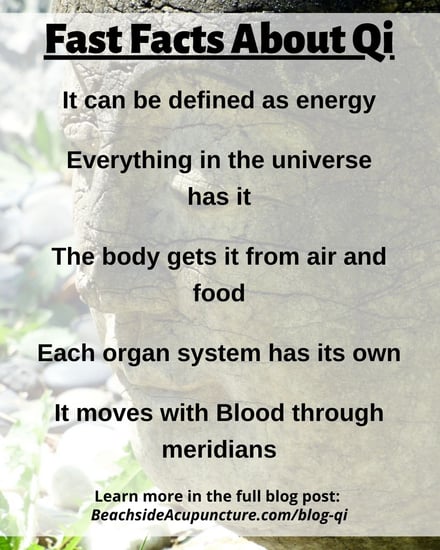
This post contains affiliate links, meaning Beachside Community Acupuncture PLLC may receive a small commission for purchases made through certain links at no additional cost to you. (In other words, you support us in a small way when you buy the products that we highly recommend and would use ourselves!) Click here to view our full disclosure policy.
Qi is arguably the most misunderstood concept in Traditional Chinese Medicine (TCM), to the point that we've had patients wonder if acupuncture might conflict with their religion. Qi can be defined as energy, and energy is much more than its metaphysical connotations.
Qi as Energy
The simplest explanation of Qi is that it's energy, and energy is very complex in modern science. There are many different types - potential, kinetic, solar, nuclear, etc. - and every object has some kind of energy to it. A desk may seem solid, for instance, but really it's made of lots and lots of atoms that are all constantly vibrating.
Albert Einstein's famous E = mc^2 related energy to mass, and one of Nikola Tesla's most famous quotes is, "If you want to find the secrets of the universe, think in terms of energy, frequency, and vibration." More than just "vibes," energy is the capacity to do work and the potential for change, an intangible force infused into everything in the universe.
In a similar way, TCM believes that everything has Qi. While this is interesting from a philosophical perspective, Licensed Acupuncturists are mostly concerned with Qi as it relates to medicine.
Qi And Health
How are humans able to breathe? Although the process seems simple, there are many different answers to this question, each of which is correct in its own right.
- An M.D. would explain the intricacies of the autonomic nervous system, the physics of negative air pressure, the structure of the lungs' alveoli, and other technical aspects of the anatomy and physiology involved.
- Someone in the general public might attribute the act of breathing to the soul. (Although TCM does has the concept of soul, it's not exactly related to this question.)
- An acupuncturist would say breathing occurs because Lung Qi is sufficient, meaning the Lungs have enough energy to carry out the action of breathing. As a contrasting example, someone with deficient Lung Qi might have shortness of breath.
Just as there are different types of energy, there are different types of Qi with unique jobs. Every organ system has its own Qi, and Qi is what moves Blood through the meridians. Western medicine views the body in terms of anatomy (structure) and physiology (function); in TCM, function equates to Qi.

Habits That Benefit Qi
The body's Qi comes from air (Lung system) and food (Spleen system). Practicing breathing exercises like Qigong or yoga can support Lung system, but digestion can be more involved than simply choosing nutritious foods. The Spleen system is commonly weak in many people, but avoiding cold foods, eating mindfully, and following the advice in books like Welcoming Food can strengthen it.
Simply having adequate Qi is only one part of the equation, though; regular activity and emotional regulation are also needed to help Qi flow smoothly. Qi stagnation can manifest as pain, low stress tolerance, PMS symptoms, and more.
Following a healthy lifestyle can go a long way in the body's supply and movement of Qi. However, if these interventions alone aren't enough, acupuncture, herbal medicine, and a more targeted diet approach can make a huge difference.
This post was originally published in April of 2017 and was updated in September of 2025.

Kathleen Ketola is a Licensed Acupuncturist and the owner of Beachside Community Acupuncture. She loves providing affordable acupuncture to the residents of McKinney, Texas, and surrounding cities like Prosper, Frisco, and Melissa, but she also enjoys educating the general public on how acupuncture and Traditional Chinese Medicine (TCM) can treat everything from pain to infertility to stress and beyond. Book online or contact her at (214) 417-2260 if you'd like to schedule an appointment.










Write a comment